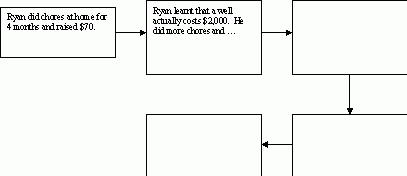![]() Back to
Frankie's
Back to
Frankie's
ESL
Worksheets
Ryan's Well - Pump it up
Pump it up (Nathan Greenfield, The Times, 27 February 2004)
ABC Television VIDEO: RYAN'S WELL
READING TASKS
in full flow a shortage diarrhoea charity work to sink a well dysentery donations a campaign on a mission bacteria a project fundraisers a Rotary Club infected a gasoline-powered drill a raffle to fetch water sponsored bike rides typhoid a non-profit organisation parasitic worms contamination water-borne diseases cholera aid agencies a hand-pump sanitation springs latrines
|
Word or Phrase |
Definition |
|
operating very successfully |
|
|
to dig a deep hole to get water |
|
|
a lottery using tickets |
|
|
organisations that help less fortunate people |
|
|
making water or food dirty |
|
|
the use of soap, toilets etc to avoid germs |
- Reading
- Paragraph 2
- In what ways is Ryan a fairly ordinary 12-year-old boy?
- In what ways is he not an ordinary 12-year-old?
- Paragraphs 2-3: We learn that Ryan has travelled "to all corners of the globe" and met many famous or powerful people. Why does he travel so much?
- Give two reasons why Ryan’s parents did not give him the money for a well.
- .
- .
- Using a pencil, add notes to the following flowchart which illustrates how Ryan got funding for "his" first well:
- Why do you think WaterCan provided funding for a documentary film to be made?
- Ryan’s mother said that she was impressed by the way he raised money for a well but that she "felt he had done his bit". (Lines 51-52) What do you think she meant by this?
- After reading Lines 52-66 add two more boxes (with notes!) to the flowchart in No. 4 above.
- Why does the writer describe Ryan as "a surprisingly shy boy"? (Line 67)
- List at least two reasons why Ryan’s visit to Uganda was memorable.
- What was tough about Jimmy Akana’s life before the well was drilled at Angolo school?
- What were the "darker traumas" that Jimmy experienced? (Mention at least two.)
- How did Jimmy get a visa to enter Canada?
- Lines 120-125
- What award did Ryan win in November 2003?
- Why did the sponsor pay for a second award?

"How The World Could Get Well" (additional text)
Using the text, complete the notes below:
|
|
|
|
|
|
|
Pipe water from springs, possibly using gravity. |
|
|
|
Improve … |
Explain the title of this text (what are the two possible meanings of the word well?).
Post-Reading: Language Study
- There are a number of places in the text where people or organisations are defined using one of the following patterns:
- Angry with his friends , Justin stormed off towards the canteen.
- Oprah Winfrey , America’s most successful talk show presenter, was born into poverty.
- Look at Paragraph 3:
- "Ryan has met the Pope … He has criss-crossed the United States …
- "He joined Prince Charles … in 2001."
Find examples of similar sentence structures in the text "Pump it up". Mark them like the examples above.
(Look at lines 14-15; 37-38; 39; 67-68; 72-74; 76; 117; 122-123; and 124-125.)
Why are two different verb tenses used here?